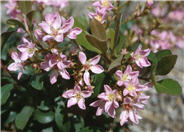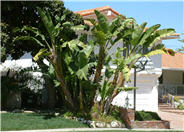
Common name:Chinese Wisteria
Botanical name:Wisteria sinensis
While the sinensis is similar to the floribunda, it bears more rounded, full clusters of strongly fragrant flowers which open more or less, all at once. There are usually 13-15 leaflets per leaf, and they require full sun and average to little watering. It comes in many colors in the blues, whites and purples.-Monterey Bay Nursery

Common name:Creeping Fig
Botanical name:Ficus pumila
This is one of the few plants that can attach itself securely to wood, masonry, or metal. Because there is no limit to its size, it can overcome an entire buliding. It is most often found in colder climates. This vine will not climb on the south or west walls.

Common name:Yellow Moraea, Fortnight Lily
Botanical name:Dietes bicolor
This clumping perennial Iris relative stands 3'-4' high. It has light yellow, iris-like flowers with maroon blotches that are about 2" wide. It performs best in full sun and in soil with good drainage.

Common name:Indian Hawthorne or Rhaph
Botanical name:Rhaphiolepis indica
This small shrub will grow 2' tall and 4' wide. It has small, dark green leaves that get a red tint in the winter and deep pink flowers that bloom fall through spring.

Common name:Lily of the Nile
Botanical name:Agapanthus praecox ssp. orientalis
This evergreen groundcover/shrub will grow about 3' tall and has large green leaves with blue flowers ( there is also a white variety) that bloom in spring and summer. It will grow in all soils but prefers loam soil.

Common name:Giant Bird Of Paradise
Botanical name:Strelitzia nicolai
This clumping evergreen perennial can reach 25' tall fairly quickly, forming a false trunk from the base of the leaves. The leaves are shaped like bananas, reaching 10' long with the widest part reaching 5' . It does best with fertilizer once a month and rich soil. It does not like wet feet so water only when dry. It can be planted in full sun but will do better if it receives afternoon shade. The flowers can reach a size of 10"-12", but plants need to be a few years old before they will flower.
| Designer: Anon | Gate with Heavy Rings |
Photographer: GardenSoft |
Soils and Compost:
Practice grass-cycling by leaving short grass clippings on lawns after mowing, so that nutrients and organic matter are returned to the soil.
Water Saving Tip:
Replace turf with groundcovers, trees, and shrubs. If you have areas where no one uses the grass, patches that do not grow well, or a turf area too small to water without runoff, consider replacing the turf with water-efficient landscaping.
Integrated Pest Management:
Drip and other smart irrigation delivers water directly to roots, allowing no excess water for weeds.

